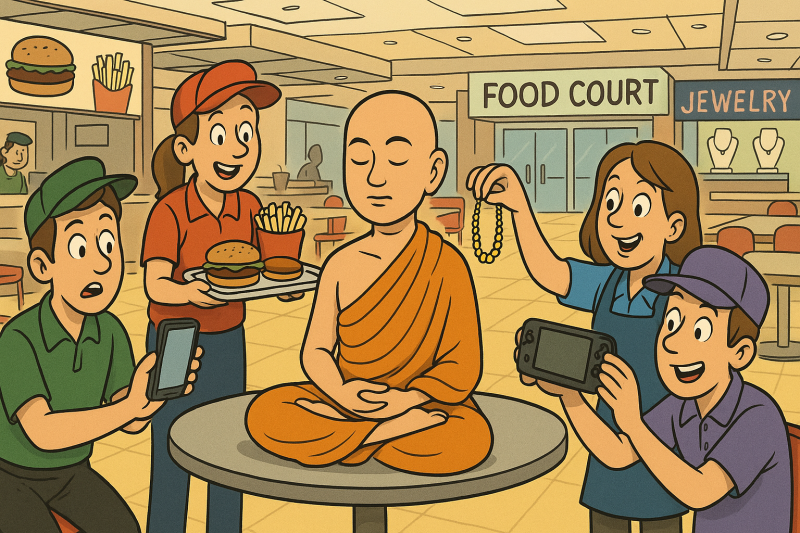The War on Zen

I recently came to the conclusion that I didn’t need any more junk food. It wasn’t a decision. I just woke up one morning with the conviction. I realised — I could feel in my body — that crisps and sweets service an emptiness that I don’t actually have. I seemingly just want something to service. I want an emptiness that I can do something about. That was the illumination. Most of what bothers me or excites me is compensation for lack of presence of mind. When one has presence of mind, there is no need of those distractions. They just don’t seem as compelling. I’m less hungry now that I’ve quit.
Junk food — all highly processed food, really — is an industry that is designed to perpetuate itself, much like cigarettes: smoking one makes you want to smoke another, and there is no other purpose. So it is with processed food. The fact that three quarters of all Americans are overweight is evidence that something has gone wrong with their food.
There isn’t really a solution for these addiction industries. The reason is that they are not problems. They are designed, either consciously or by natural selection, to perpetuate themselves. And they do.
• Television is the same. One’s attention is drawn, but not really engaged. No one says, “Now, I have had enough television; my imagination is ready to fly on its own.” Instead, one’s imagination atrophies until it is unable to serve its owner; more television is needed to fill the dearth.
• Glamour — be it fashion or conspicuous consumption — is the same. One never says, “Now I have enough glamour.” Being glamourous this season merely determines where you may appear glamourous next season.
• No one on social media says, “Now I have hated enough.” There is always some new outrage, and if real outrages are not available, social media has shown itself capable of inventing outrages. Outrage courts itself.
• The abundance of information on the internet makes fact-checking easy, but that ease does not promote fact-checking. It does not promote rational thinking and discourse. Rationality is there, among the noise, but it is equivalent to conspiracy theories and hate-speech. In the end, there is an uneasy consensus: the ideas that are repeated most often and which go uncontested most often. One’s mind can never achieve independence. All the internet promotes is the next log-in.
Again, these are not problems. These are all solutions to the problem of lack of presence of mind.
It is not possible to compromise with a harness; you’re either wearing one or you’re not. You’re either addicted to distractions or not — if not, then, a handful of distractions satisfies no need.
There is no way to get good with this. There is no exit; all doors are entrances.
A sustainable human future is not going to be one of waiting, hoping, complaining, and begging, while we are otherwise distracting ourselves. It is going to be one in which humans cultivate the time, energy, and skill to solve humanity’s problems.
The first step is to say, “Hi. I’m ________ and I have defeated zen.”
More posts in the Mental Wealth series:
